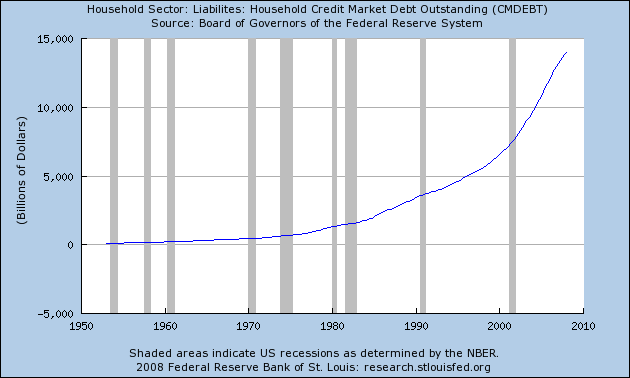My premise is as follows:
I have heard multiple persons saying that one of the main causes of the current economic downturn is that we were living beyond our means through the use of credit.
I personally don't know one way or another.
I've avoided credit card debt in my own finances, but blindly (stupidly?) fell into education debt that is greater than many credit card debts.
And I didn't finish the course, either.
Still upsets me...At myself.
What are your opinions on this issue?
Is credit a good thing in some situations, depending on various factors?
All good?
All bad?
On one hand, credit can be a good thing. After all, student loans is how people in poverty can afford an education that will allow him to have a higher standard of living than a minimum wage job. Also, business loans allow the poor to start up new businesses and let them make it on their own.
However, I think this cycle of credit is a bad thing. I'm not an economist, and I admit that, so my theories on this may be wrong. However, it seems to me that we basically require student loans to get a marketable education. This puts most people in debt right away. Because they're so busy getting an education and training for their chosen occupation, and no business will pay them a decent wage because they aren't worth one because they're too inexperienced, they then have to get housing loans so they can get an apartment or house. This is done with the understanding that people will eventually pay back those loans once they get a wage due to their education and training.
So everybody lives beyond their means for education and housing. This means that they are using more supplies for education and housing. This increases the demand for it, and thus increases the prices for education and housing. Which, in turn, increases the amount of student loans and housing loans that people have to get.
And so because of this the need for more and more credit rises just to maintain a decent standard of living. But as credit rises, people can afford more things. This increases the demand of goods and services, which increases the prices, and thus further increases the amount of credit people need to have in order to have a lifestyle that "isn't poor."
To this end, I
really think we need some kind of reform for how students pay for their education and occupational training. After all, too much of a student getting a loan is dependent on them getting a job that will pay them a salary that will allow them to pay off their loans. But it never answers the question of what happens if a person can't get a job that pays enough to pay off the loan. It also doesn't take into account that the businesses will try to pay their workers as low of a wage as they can while lenders will try to collect as high an interest as they can.
This is why I would really prefer that some of our occupations have their education nationalized, especially medical professions. Our medical professionals can have free education and training and they get this by working in public hospitals for a time. This way, anyone who wants a free education can do so by serving in a hospital. This will also have the related advantage of teaching most citizens about medical wellness, which will then lower health care costs as they'll be more likely to live a healthier life because of their basic medical training and education. After serving their commitment, they can then go on to a private practice if they so choose or can stay and serve in a public hospital.
This is what I've noticed just from my intuition, so I may be oversimplifying things, and my solution may be a bit too narrow, but that's the idea I have so far. I really would like to see some better post-secondary education reform, especially with regard to student loans, and one that doesn't comprise solely of "Get rid of the Department of Education."



